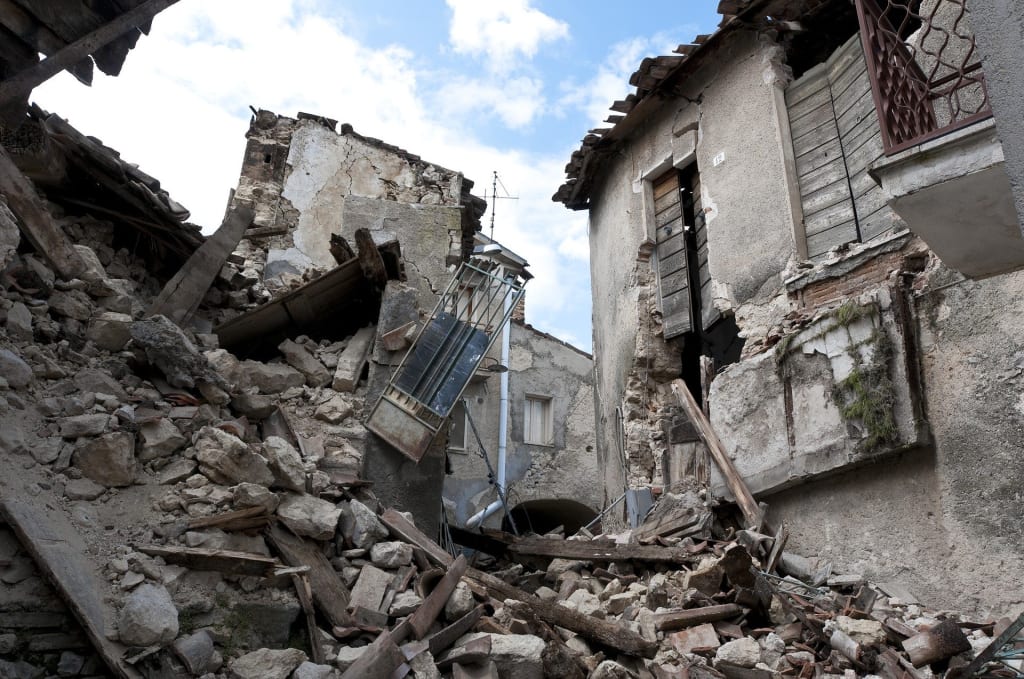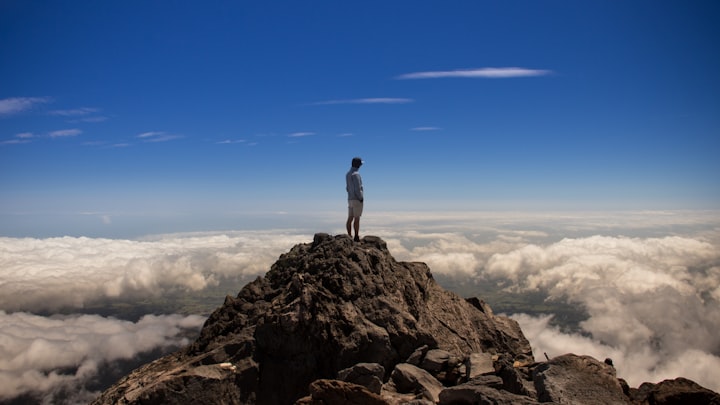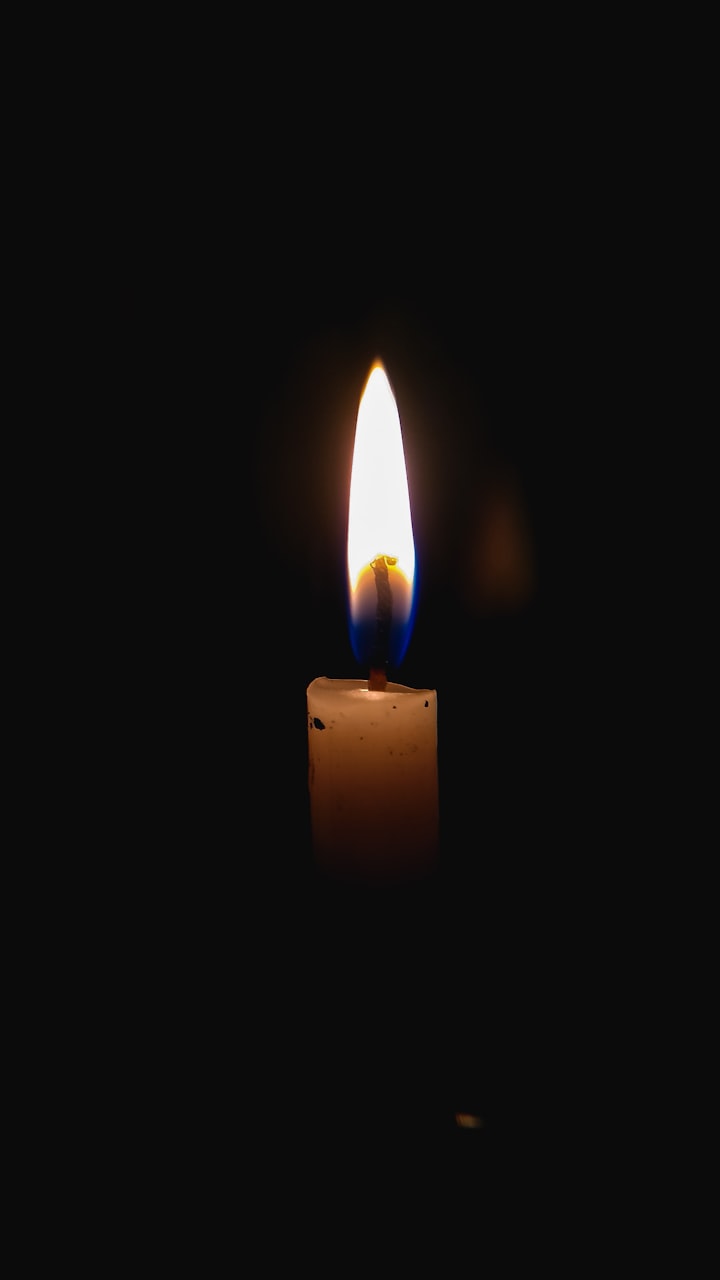How to Survive an Earthquake on Vacation
An unexpected natural disaster can be a buzzkill if you're not prepared.

Growing up in Florida meant that I learned how to track the path of a hurricane in school at a young age. I remember being given a paper map and checking the news each morning to plot the updated location, then using that information to make an informed opinion of which direction it would go in the following days.
I got up close and personal with many tropical storms and hurricanes, and distinctly remember taking my transparent glittery inflatable chair outside to float down the street with my friends. I should warn you that it's not recommended as there are plenty of potential hazards and down power lines, but the 90's were a different time and we got away with a lot.
The hurricanes ranged in levels of destruction, but one thing I could always count on was having fair warning that it was coming. I knew days (if not a week) in advance that we had to prepare supplies for power outages, put on the storm shutters, fight long lines at the supermarket and load up on gasoline for the generator.
In the days after a storm lines at the gas station would wrap around the block, citywide curfews would be in effect, and supplies would be limited. I remember once having no power for nearly 8 weeks. School was cancelled and I spent a lot of time charging my phone at the local hospital and hanging out with my friends. People siphoned gas out of strangers vehicles and the only place to eat that was open was Einstein's Bagels. I think that's where my love for the Asiago bagel with cream cheese started, but I digress.
Earthquakes are different, as I learned the other night. While in Mexico City, I was sitting on the couch watching Lego Masters (don't knock it 'til you've tried it) when THE alarm sounded. At first I thought it could be an ambulance, I looked to my boyfriend who had also taken notice of it, he quickly paused the TV to hear the sound more clearly.
He stood up and said something along the lines of, "Run. Outside. We have to get outside, NOW!" I had been told of what to do in the past, but this was my very first earthquake and I didn't know what to do first. It had been raining all day and night so I asked, "Do I put shoes on? Do I bring the cat?" He said yes to both, so I threw on my closest pair of shoes which was a cute new pair of black moto boots over my baggy sweatpants, grabbed the cat and ran out the door.
While running down five flights of stairs in a slight panic holding a cat who's more freaked out than I am, I realized my huge boots were slowing me down and wished I had on sneakers (or no shoes). He guides me downstairs by the shoulder out into the street. People in varying stages of undress poured onto the sidewalk and into the street.
Breathing heavily with a rain speckled cat clawed into my neck while we took inventory of our surroundings. We didn't feel too much shaking but could see the lamp post swaying in the air, and the crystal of a chandelier across the street moving abnormally. The earthquake was stronger in Acapulco, so the effects in Mexico City were pretty mild despite it being a magnitude 7 earthquake.
We stayed outside for a few minutes surveying the reactions of others who seemed to be interested in checking their phones and contacting loved ones. We returned upstairs and that's when my anxiety set in, a heavy weight sat upon my chest and I felt slightly overwhelmed. I had just experienced my first earthquake (albeit uneventful) and my body and mind were still processing it.
I sent my mom a text to tell her we were okay, just in case she saw it on the news the next day. Life went back to normal, we resumed our show on TV and chatted about what other earthquakes have been like. Social media lit up with photos and videos of the damage done elsewhere.
I am grateful that my first earthquake experience happened while in the company of someone I trust who could show me what to do. If it had happened in the middle of the day when he was at work and I was who knows where, it would have been a lot scarier for me.
Take a look at the theories behind why earthquakes occur, what makes them so hard to predict and the warning system technologies we rely on today:
If you find yourself experiencing your very first earthquake, what you should do varies greatly depending on where you are. For example, in California many newer buildings are built to withstand earthquakes and they recommend staying indoors.
Elsewhere like Mexico City for example, many buildings are older and the ground underneath is actually a filled in lake, so there's more movement of structures bound to occur. Here's what you should do if you experience and earthquake in Mexico:
If You Are Inside A Home Or Building during an Earthquake
Quickly evacuate the building by use of the stairs. Run down in your pajamas, and bring your pet with you. If you cannot escape the building in time then consider the Drop, Cover, and Hold on Method.
Protect yourself during earthquake shaking: Drop, Cover, and Hold On
- When the quake starts, drop to the floor (it's easy to get thrown off your feet and injured if you try to run while the building is moving).
- If a table or other form of cover is nearby, then move quickly (crawling works) to get underneath it.
- Finally, crouch in position, with one arm over your neck and head, and another holding on to the table leg.
What to Do During An Earthquake If You Are Outside
Move to a space where it's unlikely that something will fall on top of you. Trees, powerlines, buildings, etc. can all be dangerous if shaken loose. Get to an open area and stay put. The closest open area for us while in the city was the middle of the street.
If You Are In Your Car Or Driving and an Earthquake Strikes
Pullover to the side of the road out of the way of traffic and wait for the quake to stop.
There are many theories of what the best things to do during an earthquake are, please do your research into how to best handle this scenario in your area. For example, hurricane standards in Miami are vastly different from those in Haiti, so the preparation would certainly be different.
Natural disasters can be scary. By having knowledge of how to handle them beforehand you are at an advantage when the time comes.
About the Creator
Candice Galek
Miami based entrepreneur turned environmental non-profit founder. Forbes 30 Under 30 Honoree. Inc. Magazine columnist. Always learning.







Comments (1)
Great tips. Whatever you do, do not panic. Sorry to know that you and your partner experienced this in Mexico. Well deserved top story.